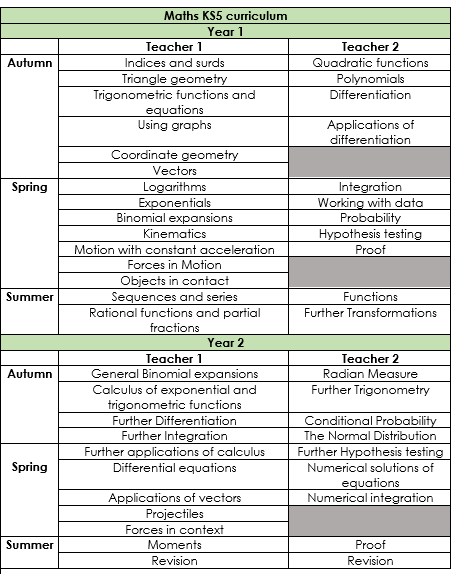Key Stage 5
Mathematics
Exam Board: AQA
Over the course of the two years in A-Level Maths the content is split into three areas; Pure, Statistics and Mechanics.
Within the Pure Mathematics you will study a range of core topics that form the building blocks of the subject; including proof, algebra and functions, co-ordinate geometry, sequences and series, trigonometry, exponential functions, logarithms, differentiation and integration.
Statistics and Mechanics are both known as Applied Mathematics because of their applications in the real world and to other subjects, such as the Sciences and Geography. Statistics topics will include sampling, data presentation and interpretation, probability, statistical distributions and hypothesis testing. Mechanics will cover kinematics, quantities and units in mechanics, vectors, moments, forces and Newton’s laws.
Overarching all of this content are the themes of mathematical argument, language and proof, mathematical problem solving and mathematical modelling. These aim to deepen your understanding so that you can develop as an analytical thinker and problem solver and transfer these skills into life beyond A-Level.

Assessment
100% examination
Requirements
College Entry Requirements and a grade 7 or above in GCSE Maths.
Where can it lead?
With this A-Level you can go on to study a range of different degrees at university. Some will use the skills learned in degrees such as Mathematics, the Sciences and Engineering, which build upon the A-Level content. It can also support applications to courses such as Medicine, Economics and Finance, where the content may not be directly built upon, but the skills used can be transferred. Even if you choose a different route to those above, the analytical thinking and problem solving skills that are developed within this topic mean that Mathematics is a highly respected A-Level by employers.
